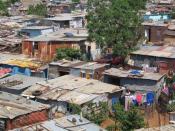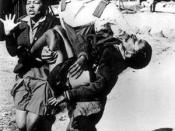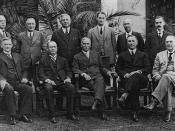Francis Meli in A History of the ANC believes that the African National Congress can be split into several time frames each facing different situations and going about dealing with them in different ways. The relevant period of the 1970s to the 1980s which we are to deal with in this essay can be best analysed in chapter 7 of his book The re-emergence of the ANC (1969-1985). I am not simply trying to deal with the ANC here, merely pointing out that he sees this as a comeback for his union. Whether or not this is the same for other unions at the time is to be seen, also what effect they have on politics also needs to be analysed. I do know from the time period 1969 onwards that this was a successful time for those in favour of black liberation in South African politics so taking this line of approach as "a revival of the unions" may go a long way to discover what effect the unions had on political change in the 1970s and 1980s.
Certainly each decade in the recent political history of South Africa has specific characteristics that serve to mark it apart. We can see that the 1950s were a time of apartheid implementation whereas the 1960s were a decade in which opposition movements were intensely repressed, banned, driven underground or exiled abroad. The 1970s however took a different shape, as I have mentioned earlier, one that witnessed the re-awakening of opposition to white supremacy. It marked the countless strikes in Durban, the Soweto uprising of 1976 and the ascendance of black consciousness movements as well as other independent trade unions. The 1980s can clearly be seen as time whereby the groundwork was clearly laid for transition to democracy in the 1990s.
Taking this viewpoint that the 1980s culminated in laying the groundwork for democracy to occur in the 1990s, it is essential to state that the only way that any political changes were going to occur would have to be through exerting excruciating pressure on the government to make small concessions. A strong government like the South African government unless overthrown will normally only make conservative concessions, not wishing to alienate its electorate or go against its ideological beliefs. If we are to analyse what effect the unions of the 1970s/80s had on the government then we must understand that any effects can only be felt over a long term period of time and are commonly indirectly related incidents. For example, huge union pressure may be linked to unions in other countries which in turn lobby their government to disinvest in the oppressive government's country. This essay will therefore aim to look at the effect of unions in a wider sense, looking, for example, at what social groups they affected and how their growth was linked with the economical situation in South Africa.
It is necessary to point out that in 1960 the banning of the ANC and the PAC had left the Africans voiceless and vulnerable to any governmental measure, namely the new large scale social engineering which the Homeland policy implied. However Davenport points out that "there were signs during the early 1970s of a new approach to politics less optimistically liberal...more realistic in its appraisal of political forces...and less vulnerable to the charge of collaborationism"1. I would like to first take a look at the black consciousness movements in this revival. The black consciousness movement emphasised cultural and psychological freedom amongst Africans rather than dealing with direct political and socio-economic issues- mainly due to fear of governmental repression. This movement was totally opposed to living with the white man, as Biko stated: "to emulate the white man they are insulting the intelligence of whoever created them black"2. The brief breathing space allowed to the black consciousness movements by the state in its early years, enabled it to gain influence among a new generation of young activists, many of whom moved to play a leading political role in the post-1976 period. It is important to state that the ideas of black consciousness spread rapidly in the early 1970s as did the membership of SASO (South African Students Organisation). However movements under the black consciousness umbrella, although well organised seemed to me to be flawed by the way they went about attempting to gain power and equality. They detested any help from whites, especially any foreign aid of any sort and were likened by many liberals to the Black power movement in the United States. Alan Paton states: "Black consciousness wants to change things and rightfully so...but you can't change the order without power...how long will the young zealots be satisfied with a mush of culture, mysticism and going round saying "haven't I a lovely skin?"'. Clearly this movement appealed to a lot of Africans as well as encompassing ethnic minorities within Africa. However this movement would never gain any power or push if it was to turn down white liberal help with its aggressive ideology. Hostility came from the exiled black political movements as well as those white liberals. Nevertheless the offspring of the black consciousness movement (after the trial of the movement for terrorism) "The Black Renaissance Convention" was an unambiguous sign that blacks could successfully be brought together under one cause even though they had divergent views. The Soweto uprising made it obvious that the apparent compliance of the previous decade was no longer justifiable, and there was mass backing for radical modifications to the system that could be mobilised into action. Although seemingly revolving around education issues and specifically the language of instruction in schools, and initially confined to high school students, the uprising gave expression to apparent dissatisfaction and growing frustration with social and political conditions among the black population at large. Although support for Black consciousness was limited to the youth and intelligentsia there is no doubt that the students' defiance had an enormous political effect. Suspected police informers were killed, policemen's houses were burnt down and the entire Soweto Urban Bantu Council resigned in 1977 through pressure from the local students. Student unrest also contributed to wider concessions such as those in education due to the whites' fear of urban blacks. As one senior Nationalist called Heunis once said "the impatience...frustration...rising expectations and aspirations of blacks had to be taken into account in policy making"3. No doubt this is important in motivating political change in the latter years as society was changing with violence becoming the modus operandi of these black movements.
The next area to move onto is the issue of how unions have affected South Africa economically and thus provoked political change. In the factories from 1973 onwards the unions associated with black workers really fostered a strong sense of working class power among Africans which presented a real threat to the South African government. The government tried but could do very little to stop workers striking and asking for higher wages. Repression itself forced upon by striking workers was looked upon by Western governments as despicable and it is clear that boycotts by the American Mineworkers Union due to this made the South African government feel boxed in. More and more companies such as Ford and S.K.F had granted limited recognition to African trade unions thus giving the South African government the feeling that the situation was slipping out of control.
By the late 1970s, links had been established between the rising protest movement inside the country and liberation movements outside of it, primarily the ANC which was well positioned to serve as an address for the masses looking for leadership. By the early 1980s it had established itself as the most prominent opposition organisation by far. The 1980s uprisings used the ANC and the personal image of Nelson Mandela as powerful symbols and it can be seen that the ANC made its impact as an absent presence - physically absent but maintaining sufficient presence through cross-border and covert links to be able to exert influence over events.
To conclude this essay, it is excruciatingly hard to point out what exactly was responsible for political change in the 1970s and 1980s. As I mentioned at an earlier point in my essay you can rarely directly affect the government, after all any party in power is conservative and would therefore not execute policy without trepidation. There are so many different factors at play in South Africa at this time as well. Pressure comes from international governments, international trade unions, internal conflict amongst the black Africans, dissent from the whites about the African condition, students and the church, as well as others I haven't mentioned. My point is that it is difficult to isolate a particular trade union, indeed even the whole trade union movement because no government publicly and in the short term gives ground to unions in conflict with their ideological beliefs. Obviously the South African government took concern when dealing with the unions, however how much policy change has to do with unions is a matter of controversy. I personally believe that unions were so very important in securing leverage from which black Africans can become enfranchised in the 1990s. However they, like many other structures, people and institutions must be placed in context if they are to be assessed for their utility. My concluding remark is that the trade union movement was vastly important, helping to give black Africans a voice, not as one but as a whole, it was an educator as to how they were being repressed and the violent sector of their unionist activity clearly showed how much they were being repressed and equally how far they would go to get what they wanted.
Bibliography:
T.R.H, Davenport South Africa:A Modern History MacMillan Press, 1987
M Lipton Capitalism and Apartheid Gower Publishing, 1985
F Meli South Africa belongs to us Zimbabwe Publishing House 1988
G Gerhart Black power in South Africa University of California Press 1978
P Price Apartheid Regime University of California Press 1978
R Gibson African Liberation Movements Oxford University Press 1972
References:
1:T.R.H, Davenport South Africa:A Modern History page 418
2:P Price Apartheid Regime page 84
3:M Lipton Capitalism and Apartheid page 345


